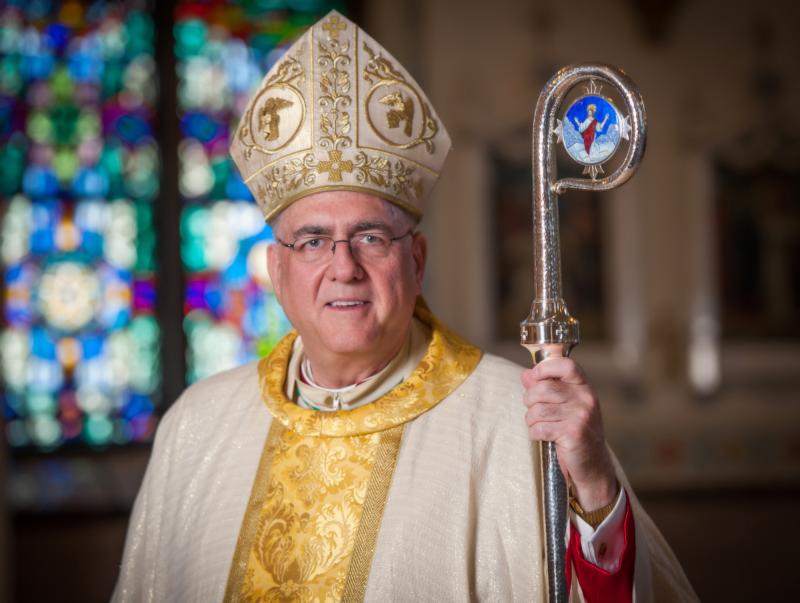
by Archbishop Joseph F. Naumann
In St. Matthew’s Passion narrative, on three different occasions, Jesus responds to questions with variations of the phrase: “You have said so.”
The first time occurs after he has told his apostles that one of them will betray him. They all begin to reply one after another with their own question: “Surely, it is not I, Lord?”
The fact that they ask the question betrays their own lack of confidence in their ability to remain faithful.
Peter is the exception. He boasts: “Though all may have their faith in you shaken, mine will never be.”
We all know how that turned out. Several verses later in the courtyard of Caiaphas, Peter, weeping bitterly, exits the Passion narrative because he swore three times that he did not even know Jesus.
Judas, like the other apostles, asks the question: “Surely it is not I, Rabbi?” To which Jesus replies: “You have said so.”
Note that, in contrast to the other apostles, Judas addresses Jesus as “Rabbi.” The other apostles acknowledged Jesus as Lord, implying they have given him authority over them. Judas recognizes Jesus as a teacher, but he has not surrendered his heart to Our Lord’s will.
Later in the Passion, when Jesus is being interrogated by the Sanhedrin, Caiaphas, the high priest, demands: “I order you to tell us under oath before the living God whether you are the Christ, the Son of God.” Jesus replied again: “You have said so.”
Later still in the Passion narrative, when Pontius Pilate is attempting to find a graceful way out of being forced to convict Jesus, he asked: “Are you the king of the Jews?” Jesus responds again: “You say so.”
In each of these instances, Our Lord used an idiom essentially to say “yes.” Jesus makes no compromises with the truth, even when that proves very inconvenient.
Our Lord affirmed the uncomfortable reality that Judas was a traitor.
Jesus acknowledged to Caiaphas that he is the Christ, the Son of God. In so doing, Our Lord essentially sealed his fate with the Jewish religious authorities.
When Pilate asked Our Lord if he was the king of the Jews, Jesus does not equivocate. By acknowledging his rightful claim to this title, Jesus has made certain his crucifixion.
Our Lord has validated the accusation of the Jewish high priests — namely, he is a threat to Caesar. Pilate believes he has no options but to permit what the enemies of Jesus desire: to allow Our Lord’s execution.
In St. John’s Gospel, Jesus informs Pilate that his kingdom does not belong to this world. In other words, Jesus does not claim to be an earthly ruler like Caesar.
Our Lord counsels Pilate that he came into this world to testify to the truth and everyone who belongs to the truth listens to his voice. This prompts Pilate to pose the million-dollar question: What is truth?
Earlier in John’s Gospel, Jesus asserts that those who become his disciples will know the truth and the truth will set them free. What is this truth to which Jesus alludes? With Pilate’s unwitting cooperation, this truth is revealed on Calvary — namely, God’s amazing, merciful love for each of us.
The freedom that springs from the truth of God’s love is quite different from the world’s notion of freedom. Freedom for Pilate was not much different from our cultural notion today. It is the ability to choose to do what I want to do, when I want to do it. Freedom for Jesus was to embrace his Father’s will, to choose to do the good — to choose the noble, to choose to love.
Jesus came to teach us the truth about God, the truth about his love and mercy. Jesus came to teach us the truth about ourselves — namely, that we are made in the divine image.
We are made for greatness. Jesus came to make us his sisters and brothers and thus become beloved daughters and sons of his heavenly Father.
This truth makes us free, because we can live this truth and exercise it in any circumstance. There is no situation in which we cannot choose to do the Father’s will, to love others by seeking their good before our wants and desires. This is the truth that sets us free!
We can exercise this freedom in any and every situation. This understanding of authentic freedom can be lived as a child or senior citizen, as married or single, as a CEO or sanitation engineer, as a president or a prisoner, in the midst of a pandemic or a “shelter in place” order.
With Jesus, we always live in the truth of our identity. As beloved sons and daughters of a loving and merciful God, we have been set free to live our true identity anywhere and everywhere.
For Jesus, freedom and truth are tethered to each other, unlike our secular culture that proposes we can be whatever we imagine ourselves to be, no matter how contradictory it may be to physical reality. This is a fool’s freedom that can only lead to personal confusion and moral chaos.
When our life in this world is complete and we come before the tribunal of God, hopefully we can say with integrity and certainty that we are a faithful disciple of Jesus. And Our Lord will reply: “You have said so!”


